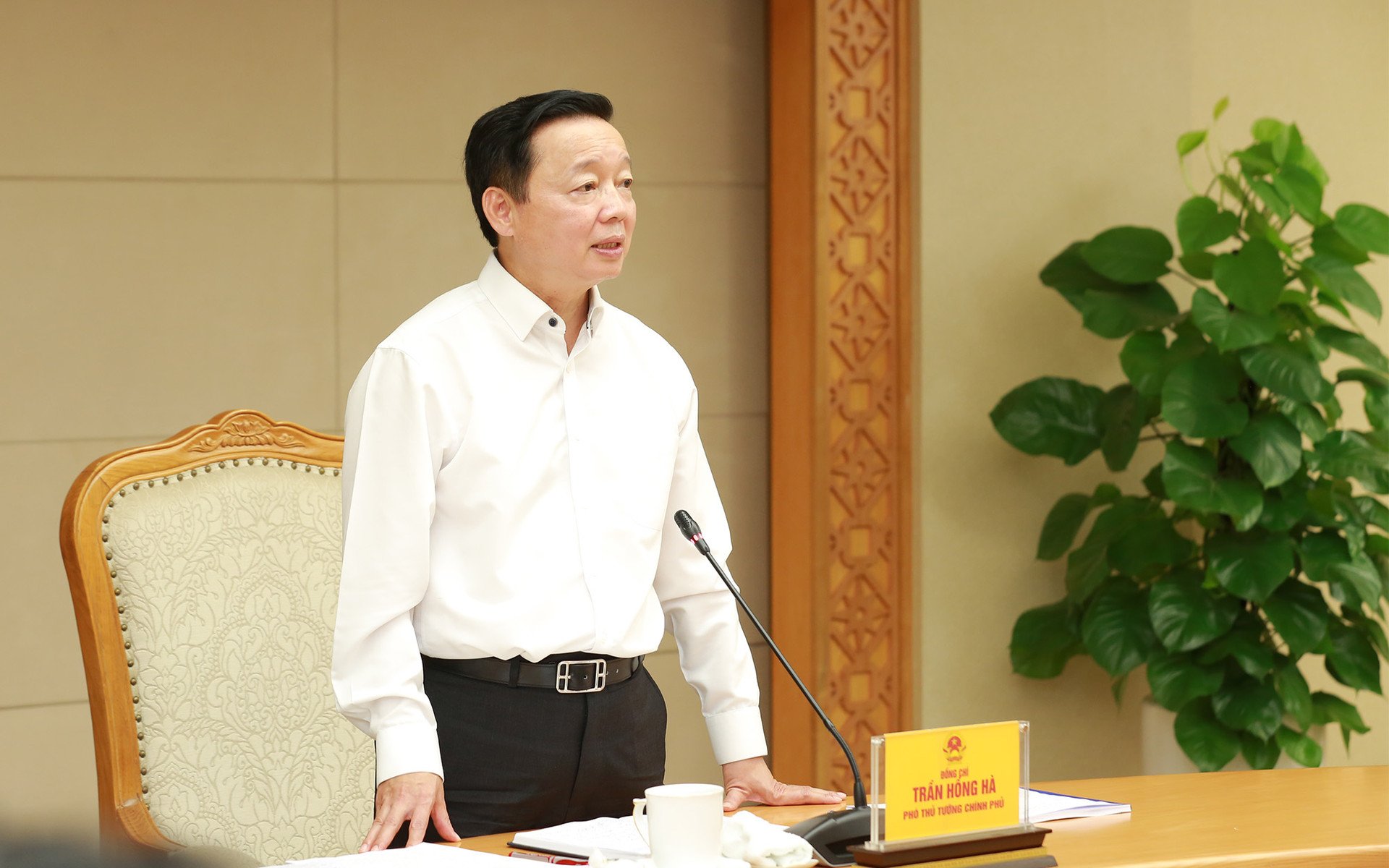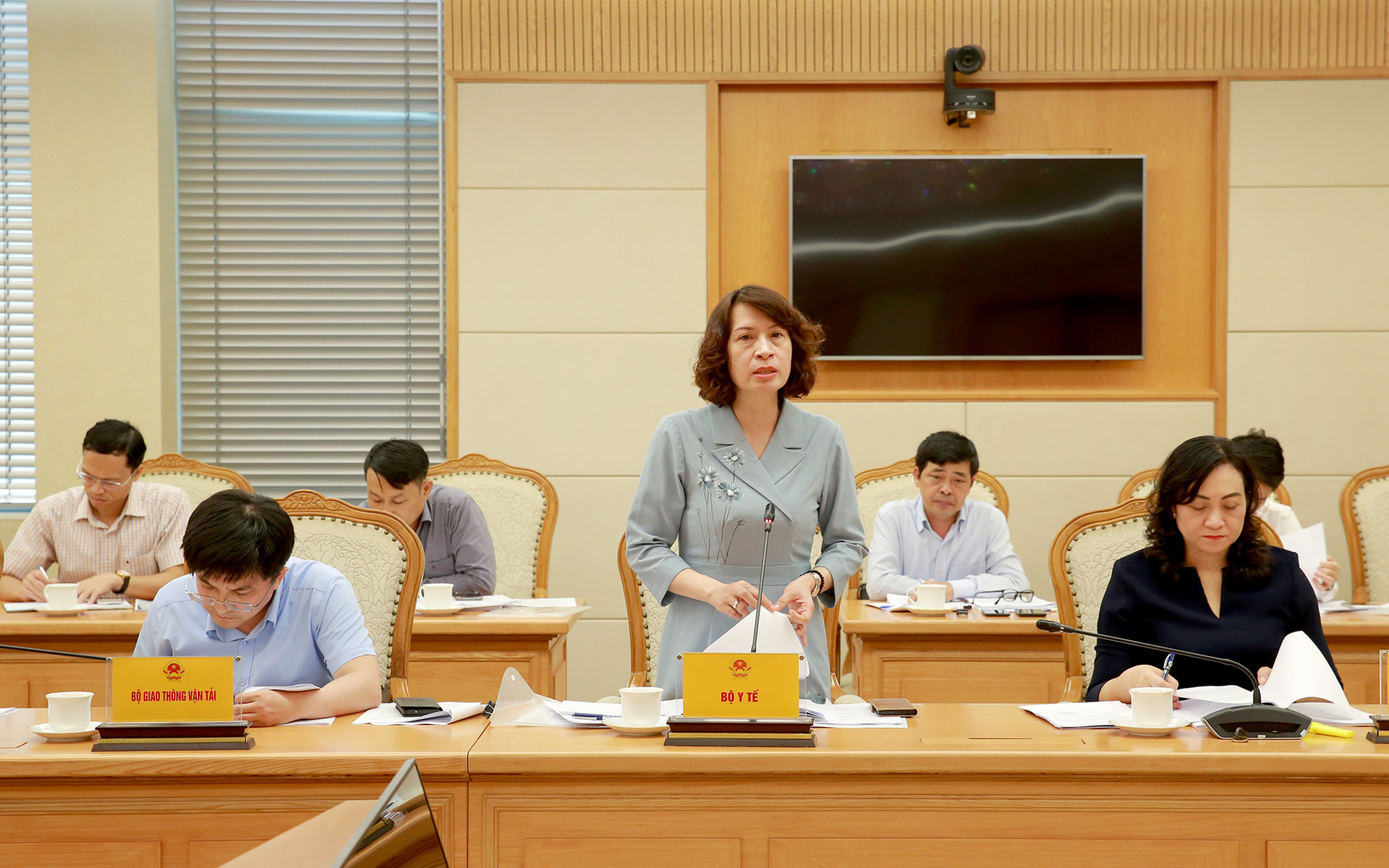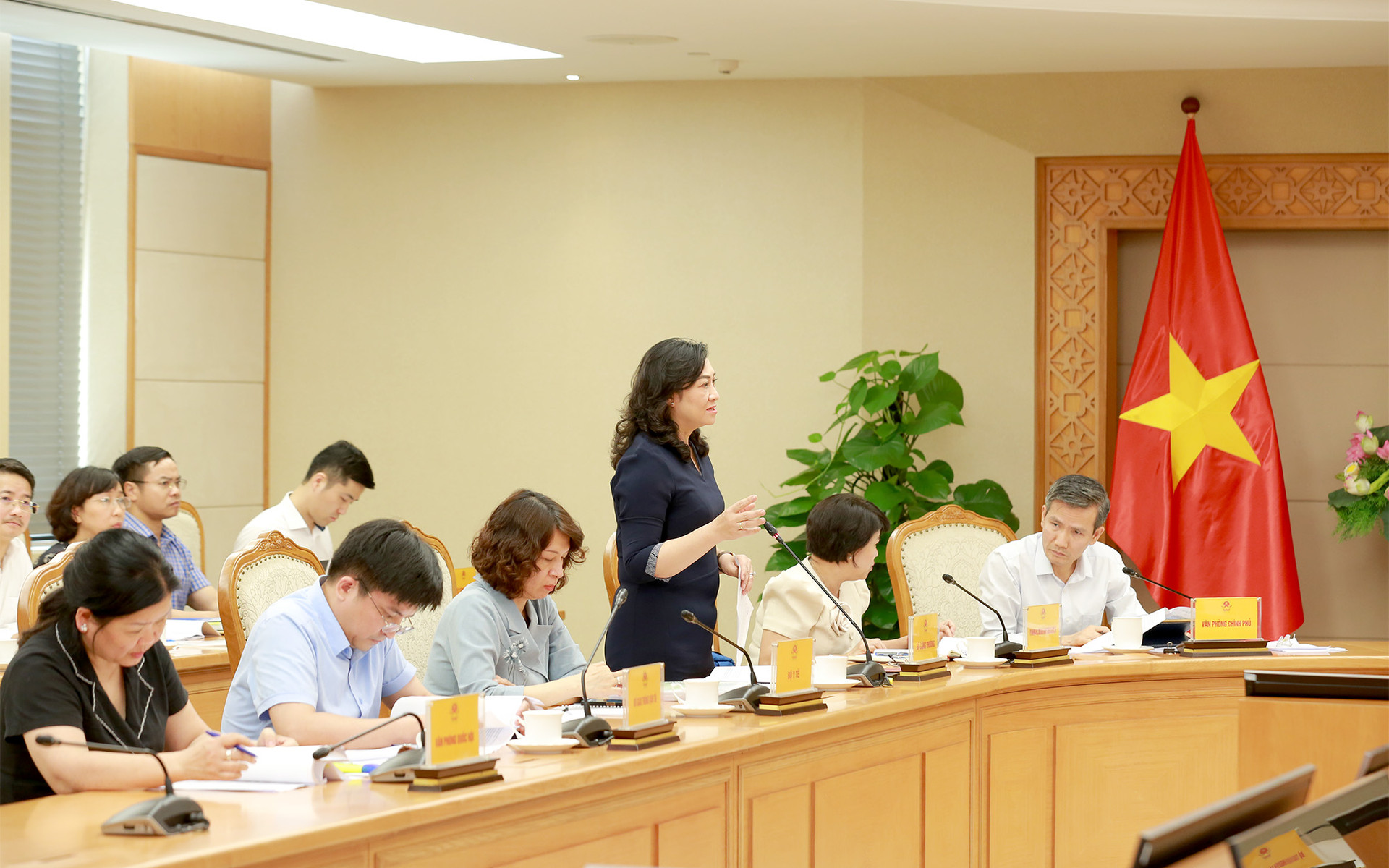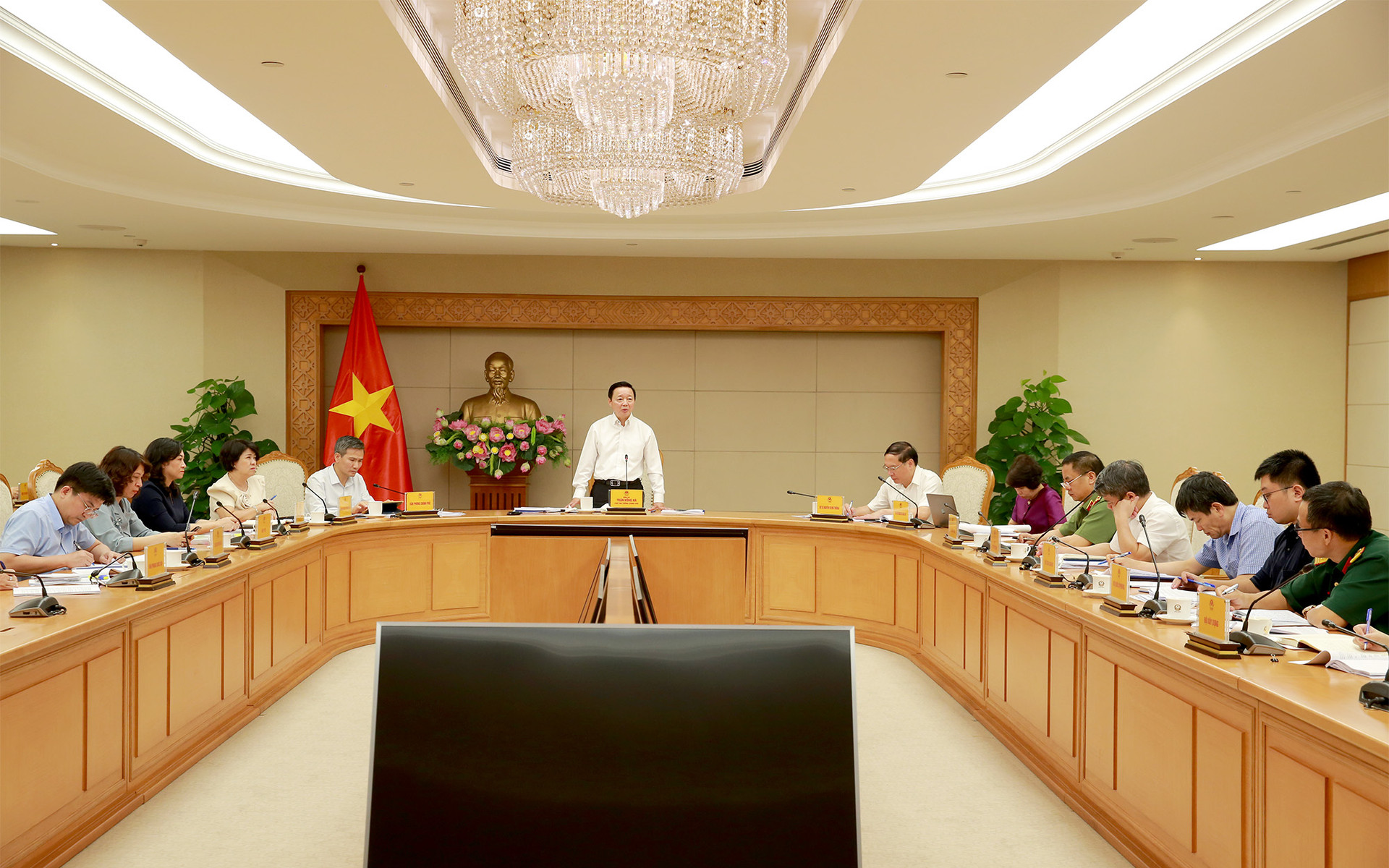Deputy Prime Minister Tran Hong Ha emphasized the need to ensure access to clean water for all people - Photo: VGP/Minh Khoi
Strengthening water resource protection and water resource restoration
During the process of drafting the Law, the Ministry of Natural Resources and Environment has specified regulations on water resource management for fresh water, surface water and brackish water; specified more clearly the solutions for preventing and overcoming the consequences of water-related harm; reviewed and supplemented some specialized terms to ensure completeness, consistency and ease of understanding; studied and supplemented functions on flood prevention, urban flood control and prevention; responsibilities for management, decentralization, and separation of state management between the Ministry of Natural Resources and Environment, the Ministry of Agriculture and Rural Development, the Ministry of Industry and Trade , etc.; and reviewed solutions for scientific and economical water use, and an approach towards water resource circulation.
After receiving comments from National Assembly deputies at the 5th session of the 15th National Assembly, the draft Law continued to be adjusted and supplemented with regulations on water resource protection and water resource restoration; water resource regulation and distribution activities, water resource scenarios and responsibilities of relevant ministries; registration, licensing of water resource exploitation and use; encouragement and priority for the use of circulating water and water reuse; responsibility for water resource management, etc.
At the meeting, leaders of the National Assembly's Committee on Science, Technology and Environment, the Ministry of Industry and Trade, the Ministry of Planning and Investment, representatives of the Ministry of Finance, the Ministry of Agriculture and Rural Development, the Ministry of Transport... proposed that the Ministry of Natural Resources and Environment supplement the subjects and scope of regulation of the Law on Water Resources; clarify the scope of state management of urban and rural domestic water supply; determine the subjects, scale of licensing, registration of water resource exploitation as well as the authority and decentralization of authority of each level of agency;...
Ms. Nguyen Thi Le Thuy, Vice Chairwoman of the National Assembly's Committee on Science, Technology and Environment, proposed to urgently establish a synchronous, accurate, scientific water resources database and promote digital transformation of management agencies and enterprises as a basis for regulating and distributing water resources based on the overall water use plan of economic sectors; clarify the role of river basin organizations.
Meanwhile, Deputy Minister of Health Nguyen Thi Lien Huong said that the Law needs to supplement regulations on water quality control during the pumping and supply of domestic water to direct users; and the obligations and responsibilities of households and individuals who exploit and use groundwater.
Deputy Minister of Industry and Trade Phan Thi Thang proposed policies and incentive mechanisms for businesses to invest in and build water supply systems and support people in remote, isolated and disadvantaged areas to access clean water; increase environmental protection fees for domestic wastewater to raise people's awareness of saving water use.
Deputy Minister of Health Nguyen Thi Lien Huong said that the Law needs to add regulations on controlling water quality during the process of pumping and supplying domestic water to direct users - Photo: VGP/Minh Khoi
Lack of awareness of water scarcity and pollution
Concluding the meeting, Deputy Prime Minister Tran Hong Ha highly appreciated the quality of the draft revised Law on Water Resources, which received a high consensus from National Assembly deputies when discussed at the 5th session of the 15th National Assembly, especially on issues with different opinions such as the division of functions, tasks, subjects, scope of regulation, etc.
Intellectual and accurate contributions from National Assembly delegates have been received and agreed upon to make the draft Law clearer, more concise, complete and profound.
According to the Deputy Prime Minister, in reality, Vietnam is a country with water scarcity, but all levels, sectors and people have not yet properly recognized this issue, as well as the increasing widespread pollution of water resources and water-related harm. In addition, there are challenges from climate change, the double impact of economic development, and socio-economic activities of countries sharing borders and river basins.
"The development of a law with a scientific basis, close to reality, and full awareness contributes significantly to solving the "problem" of water resource management in Vietnam," the Deputy Prime Minister emphasized.
Deputy Minister of Industry and Trade Phan Thi Thang proposed preferential policies to build water supply systems in disadvantaged areas - Photo: VGP/Minh Khoi
Inclusive management of the 'life cycle' of water
Regarding some specific issues, the Deputy Prime Minister requested the drafting agency, the Ministry of Natural Resources and Environment, to thoroughly grasp the viewpoint that the Law on Water Resources must regulate all types of water (surface water, river water, underground water, fresh water, brackish water, salt water, wastewater, etc.), then depending on the nature and value of each type of water, there will be appropriate management forms under the authority and expertise of ministries and branches. The management scope of the Law on Water Resources does not stop at places where there is water but must cover from the place of birth to the "life cycle" of water.
"The Law on Water Resources must institutionalize agreements that Vietnam participates in on the management, exploitation and use of transnational water resources and implement the national water resources strategy," the Deputy Prime Minister noted.
The Deputy Prime Minister emphasized the need to clearly define the functions of water resources management (strategy development, planning, legal policies, inspection, examination, water resources database) and the activities of exploiting and sustainably using water resources for the purposes of irrigation, aquaculture, agriculture, hydropower, etc.
Water resources management must have a comprehensive approach to inter-provincial and inter-national water sources, according to inter-sectoral and inter-regional mechanisms; thoroughly implement decentralization; promote administrative reform through digital transformation, integrate multiple processes, and share data and information when handling administrative procedures on management, licensing, exploitation and use of water resources, etc.
The law also needs to have strict regulations on monitoring and supervising water quality in a unified manner, avoiding waste and having a shared database; paying attention to protecting the corridors of lakes and dams related to domestic water supply; promulgating standards and regulations on water for domestic use, medical activities, agriculture, aquaculture, etc.
Deputy Prime Minister Tran Hong Ha: It is necessary to clearly define the function of water resource management and the exploitation and sustainable use of water resources - Photo: VGP/Minh Khoi
Ensuring access to water for all
The Deputy Prime Minister stated: The law must ensure the right to access clean water for all people. The price of water supply services must be calculated correctly and fully; at the same time, the impact on water users, especially the vulnerable, disadvantaged, and poor, must be assessed, as a basis for allocating State budget support, ensuring fairness and equality in access to water.
Water resource management and allocation activities need to be based on scenarios and developments of climate change and extreme weather phenomena related to water in order to have methods of coordination and allocation for different purposes, including orientations for the development of economic sectors and priority for essential activities. The Deputy Prime Minister gave an example: For the Mekong Delta, water resources are the "thread" running through economic development. Therefore, management agencies must have policies for allocating water resources (saltwater, brackish water, fresh water) for production and daily life to adapt to climate change, along with water reserve plans.
Emphasizing the importance of protecting, improving and developing water resources, the Deputy Prime Minister suggested that the draft Law clarify policies on protecting and developing water resources, especially in areas with water scarcity, no surface water, groundwater or limited groundwater resources such as islands or areas with groundwater depletion and pollution due to overexploitation. The goal is to control the balance, replenish and protect groundwater resources. Along with that, it is necessary to combine the circular economy and improve water resources, set standards and criteria for water recycling, and treat wastewater before releasing it back into the environment.
"The Law on Water Resources stipulates policies for protecting water resources, equal access to water, economical water use, and encouraging socialization... while implementation tools must comply with specialized laws on tax, planning, construction..., ensuring no overlap," the Deputy Prime Minister added.
Source
























































![[Maritime News] More than 80% of global container shipping capacity is in the hands of MSC and major shipping alliances](https://vphoto.vietnam.vn/thumb/402x226/vietnam/resource/IMAGE/2025/7/16/6b4d586c984b4cbf8c5680352b9eaeb0)













































Comment (0)